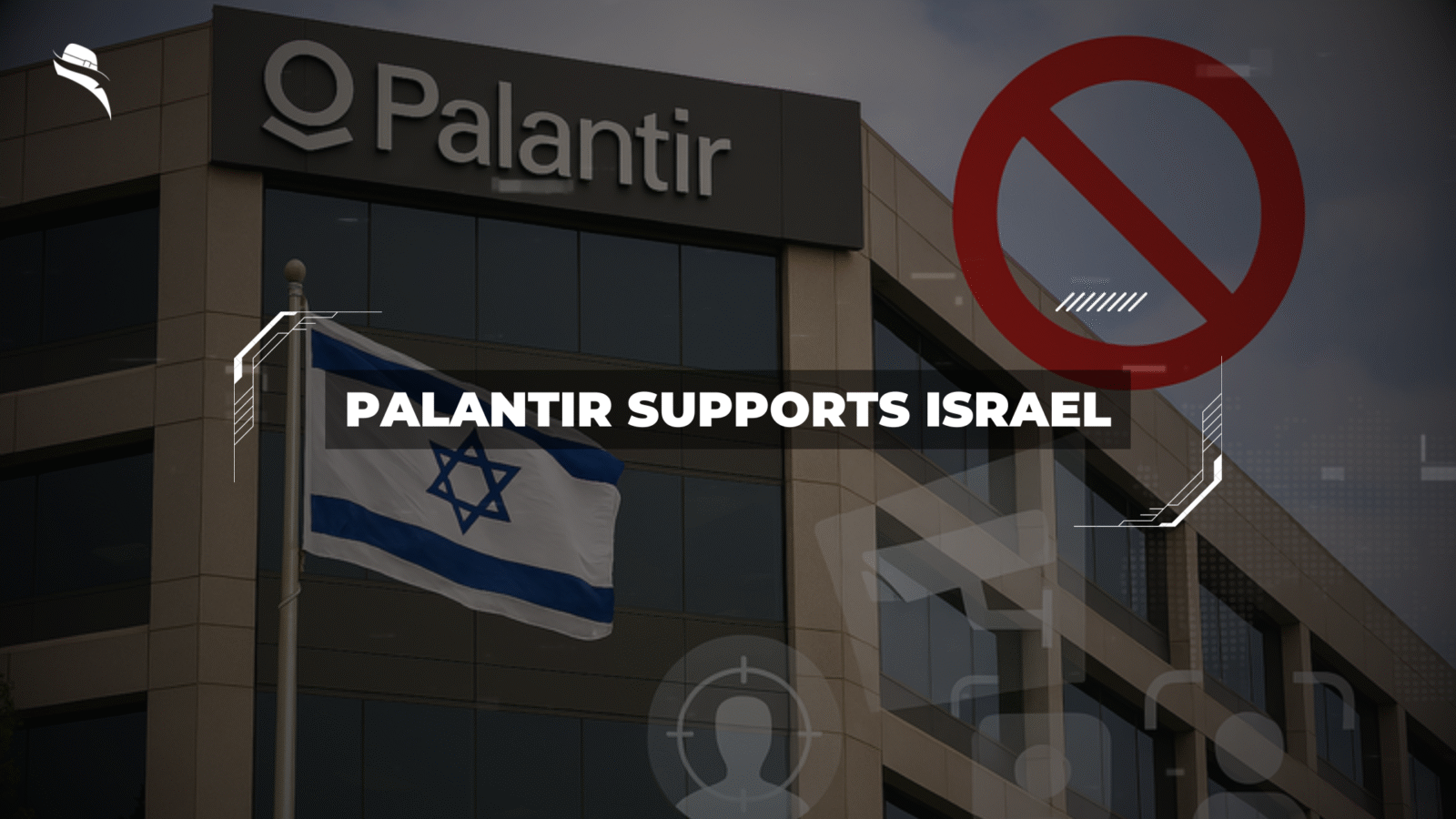In 2023, Palantir formalized a “strategic partnership” with Israel’s Ministry of Defense specifically to aid the “war effort”. The company’s advanced predictive surveillance tools and national security software have raised significant ethical concerns, however. Notably, Storebrand Asset Management, which manages approximately $91.53 billion in assets, recently divested its $24 million stake in Palantir. This decision came after discovering that Palantir data fuels intelligence operations targeting Palestinians in the occupied territories. Furthermore, CEO Alex Karp has openly acknowledged that Palantir is “responsible for most of the targeting in Ukraine”, suggesting similar capabilities may be deployed in Gaza.
This article examines Palantir’s growing role in Israel’s military operations, the specific tools being utilized, how Palantir software powers surveillance systems, and the mounting ethical backlash from investors and human rights organizations worldwide.
Palantir Supports Israel & Strategic Role in Israel’s Military Operations
In mid-2023, Palantir Technologies deepened its involvement with Israel through a formal agreement to provide critical defense technology. This partnership marks a significant escalation in the company’s role within Israeli military operations, extending beyond mere software provision to strategic operational support.
The 2023 partnership with Israel’s Ministry of Defense
The collaboration between Palantir and Israel’s Ministry of Defense officially began in July 2023, with the company signing a formal contract to supply its AI-powered software specifically for military applications. This agreement came just months before the October conflict escalation, positioning Palantir’s technology at the center of Israel’s defense infrastructure. The timing of this partnership raises questions about the company’s role in planning and executing subsequent military operations.
Statements from Palantir leadership supporting Israel
Alex Karp, Palantir’s CEO, has been vocal about the company’s alignment with Israel’s military objectives. In multiple public statements, Karp expressed unwavering support for Israel’s operational priorities. Additionally, the company’s leadership has defended its position by framing it as part of a broader commitment to Western democratic values, despite growing international concerns about human rights implications.
Palantir’s presence and operations in Tel Aviv
Palantir’s footprint in Israel extends beyond contractual agreements. The company maintains a significant operational hub in Tel Aviv that serves as the nerve center for its regional activities. This office functions as both a development center and deployment headquarters, enabling Palantir to:
- Customize its software platforms for Israel’s specific security needs
- Provide real-time technical support to military operations
- Facilitate knowledge transfer between Israeli intelligence units and Palantir engineers
The Tel Aviv operation represents Palantir’s commitment to embedding itself within Israel’s security establishment, allowing for rapid deployment of new capabilities as operational requirements evolve. As a result, the relationship between Palantir and Israeli defense forces has evolved from vendor-client to strategic partnership, with the company’s technology becoming increasingly integrated into core military decision-making processes.
Key Predictive Surveillance Tools Used by Israel
Israel has integrated an arsenal of Palantir’s cutting-edge predictive surveillance tools into its defense infrastructure. These sophisticated systems work in concert, creating a comprehensive surveillance and targeting ecosystem.
Gotham: Data integration and targeting
Gotham, Palantir’s flagship military intelligence platform, forms the backbone of Israel’s data-driven operations. This powerful system excels at link analysis—connecting disparate data points about individuals, from names to locations. Through Gotham, Israeli forces integrate vast intelligence datasets to build detailed profiles of potential targets, enabling rapid identification and tracking of subjects.
Foundry: Logistics and operational planning
While Gotham handles targeting, Foundry optimizes Israel’s military supply chains and operational planning. This platform uses Palantir’s “ontology” architecture—a sophisticated system that models real-world entities and relationships to create a unified business language. Israeli defense forces leverage Foundry’s predictive capabilities to manage equipment, supplies, and troop movements with unprecedented efficiency.
GAIA: Real-time geospatial intelligence
GAIA provides Israel with critical real-time mapping capabilities, visualizing intelligence data across geographic terrain. This system likely integrates with Israel’s existing geospatial intelligence programs that analyze imagery from satellites, aircraft, UAVs, and drones. The platform enables commanders to maintain situational awareness across dynamic battlefield environments.
AIP: Natural language AI for command systems
Palantir’s Artificial Intelligence Platform brings natural language processing to Israel’s command systems. Similar to systems developed by Unit 8200 (Israel’s signals intelligence agency), AIP likely allows officers to query vast intelligence databases conversationally. This capability streamlines decision-making processes during time-sensitive operations.
TITAN: Next-gen battlefield AI system
Potentially the most advanced system in Israel’s arsenal, TITAN represents Palantir’s next-generation battlefield intelligence platform. Designed as an “AI-defined vehicle,” TITAN provides deep sensing capabilities that enable long-range precision strikes. The system integrates sensors, networks, and automation to dramatically reduce the time between identifying targets and executing strikes.
How Palantir Data Powers Targeting and Surveillance
Beneath Israel’s targeting operations lies a complex data ecosystem. The fuel for Palantir’s AI machines comes from intelligence gathered on Palestinians in occupied territories, much of it sourced from unexpected places.
Integration with NSA and Unit 8200 intelligence
According to documents revealed by Edward Snowden, the US National Security Agency has long been a key intelligence provider to Israel. This partnership operates under a Top Secret/Special Intelligence agreement between the NSA and Israel’s SIGINT National Unit (ISNU). Critical intelligence from NSA continues to flow to Unit 8200, Israel’s elite intelligence agency, which then feeds this data into Palantir’s systems.
Use of unredacted communications and metadata
Particularly concerning is that the NSA shares “minimized and unminimized raw collection” with Israeli intelligence. This includes “unevaluated and unminimized transcripts, gists, facsimiles, telex, voice and Digital Network Intelligence metadata and content”. Essentially, private communications between Palestinian Americans and their relatives in Gaza and the West Bank are intercepted and shared, placing these individuals at risk.
AI-driven kill lists and predictive policing
Palantir’s technology transforms this raw intelligence into actionable targeting data. The process operates with frightening efficiency – from detection to “prosecution” (a military euphemism for killing), no more than two to three minutes elapse. This represents a dramatic acceleration from the traditional six-hour process.
Lavender and other IDF targeting systems
Though not directly confirmed as Palantir products, systems like “Lavender” exemplify Israel’s AI targeting infrastructure. Lavender marked approximately 37,000 Palestinians as suspected militants for potential air strikes. Officers reviewing these AI-generated targets typically spent only about 20 seconds verifying each one. Despite a known 10% error rate, these systems became the backbone of targeting operations. Another system called “Where’s Daddy?” specifically tracks targets to determine when they’ve entered family residences.
Ethical Concerns and Global Backlash
“Palantir has been using their software, their technology for AI, to target Palestinians, especially in this genocide that’s going on, and not actually too many people know about it.” — Alaa Mobarak, Palestinian-American activist and protester
Palantir’s collaboration with Israel has triggered significant ethical concerns and financial consequences worldwide. The controversy extends beyond boardrooms into workplaces, investment portfolios, and international legal forums.
Whistleblower resignations and employee protests
Internal dissent at Palantir has escalated as employees grapple with the ethical implications of the company’s work. CEO Alex Karp openly acknowledged losing staff over Palantir’s support for Israel. Former employee Juan Sebastián Pinto now leads protests against the company, claiming it betrayed democratic principles in its work with both ICE and the Israel Defense Forces. Similarly, employees at other tech giants have faced termination for their opposition—Microsoft fired workers advocating against selling cloud services to the Israeli military, while Google terminated approximately 50 employees following protests over the war in Gaza.
Storebrand and Soros divestments
Financial repercussions have been substantial. Storebrand Asset Management, managing approximately $91.53 billion in assets, divested its $24 million stake in Palantir. The Norwegian investor cited concerns about Palantir’s AI-based predictive policing systems supporting surveillance of Palestinians. Moreover, Soros Fund Management sold its entire $500 million Palantir investment in 2021, explicitly rejecting the company’s business practices.
UN and ICJ positions on war crimes and surveillance
Internationally, the United Nations Human Rights Council adopted a resolution calling for Israel’s accountability for possible war crimes in Gaza. The International Court of Justice declared Israel’s occupation of the Palestinian territories illegal. UN Special Rapporteur Francesca Albanese has specifically implicated companies like Palantir in “profiting from genocide”.
Concerns over AI as a weapon of mass destruction
Even Palantir’s CEO characterized the company’s technology in alarming terms, stating that “the power of advanced algorithmic warfare systems is now so great that it equates to having tactical nuclear weapons against an adversary with only conventional ones”. Critics increasingly view AI surveillance systems as digital weapons of mass destruction requiring strict regulation equivalent to conventional arms.
For a broader look at how global tech companies are shaping Israel’s digital infrastructure, read our main piece: Tech Companies That Support Israel
Final Thoughts
The disturbing parallels between tech companies supporting military operations and historical cases of corporate complicity in atrocities raise profound questions about accountability. Legal frameworks established by the International Criminal Court, the Yugoslavia Tribunal, and the Rwanda Tribunal explicitly recognize various forms of complicity in war crimes.
Palantir CEO Alex Karp himself acknowledges the extreme power of his company’s technology, stating that “advanced algorithmic warfare systems are now so great that it equates to having tactical nuclear weapons against an adversary with only conventional ones”. This characterization fundamentally challenges the notion that AI tools are merely neutral software.
Increasingly, financial institutions recognize these ethical concerns. Norway’s Storebrand Asset Management recently divested its entire $24 million Palantir stake, citing concerns that the company’s “work for Israel might put the asset manager at risk of violating international humanitarian law”.
Beyond financial consequences, critics argue that conflict zones like Gaza have become “relatively risk-free testing grounds” for surveillance technologies. This practice essentially transforms sophisticated algorithms into digital weapons of mass destruction, operating without the strict export controls applied to conventional weapons.
Ultimately, as Palantir’s board meets in Israel and Karp proudly declares “supporting Israel in every way we can”, the call grows louder for comprehensive regulation of AI systems deployed in conflict zones.
FAQs
1. How is Palantir supporting Israel?
Palantir supports Israel by providing artificial intelligence (AI) software and predictive surveillance systems used in military operations, including advanced targeting tools that drastically reduce the time from target identification to execution.
2. What is Palantir’s partnership with the Israeli Ministry of Defense?
In July 2023, Palantir signed a formal strategic agreement with Israel’s Ministry of Defense to supply AI-powered software for defense and intelligence operations, marking a deeper involvement in Israeli military activities.
3. What technologies does Palantir provide to Israel?
Palantir provides several systems to Israel, including Gotham (data integration), Foundry (logistics and planning), GAIA (real-time geospatial intelligence), AIP (natural language AI), and TITAN (next-gen battlefield intelligence).
4. What is Palantir’s Gotham system used for in Israel?
Gotham is used for link analysis and data integration, helping Israeli forces connect various data points to create detailed profiles and track potential targets in real time.
5. How fast can Palantir’s technology execute a military strike?
According to reports, Palantir’s systems enable the identification and execution of targets in as little as two to three minutes, drastically reducing the traditional decision-making window in military operations.
6. Is Palantir involved in AI-based kill lists like Lavender?
While not directly confirmed, Palantir’s technology operates similarly to systems like Lavender, which automatically marked tens of thousands of Palestinians as targets with minimal human review.
7. What role does the NSA play in Palantir’s operations in Israel?
Leaked documents show that the NSA shares raw communications data with Israel’s Unit 8200. This intelligence is reportedly fed into systems like Palantir’s to enhance surveillance and targeting capabilities.
8. Why did Storebrand and Soros divest from Palantir?
Storebrand divested $24 million from Palantir, citing ethical concerns over the surveillance of Palestinians. Similarly, Soros Fund Management exited its $500 million investment in 2021, rejecting Palantir’s practices.
9. What ethical concerns surround Palantir’s work in Israel?
Critics argue Palantir’s tools enable mass surveillance, AI-driven targeting, and potential war crimes. The UN and human rights groups warn that such technologies may contribute to violations of international law.
10. What has Palantir CEO Alex Karp said about the company’s involvement?
Alex Karp has publicly supported Israel’s military objectives and described Palantir’s algorithmic warfare tools as being as powerful as “tactical nuclear weapons,” raising alarms about AI misuse in conflict zones.
11. Are Palantir employees protesting the company’s actions?
Yes. Several employees have resigned or protested against Palantir’s involvement with Israel. Whistleblowers and activists, including former employees, have criticized the company’s role in military targeting.
12. What is the global response to Palantir’s role in Gaza?
Human rights organizations, investors, and international bodies have raised concerns. The UN Human Rights Council and the International Court of Justice have both criticized Israel’s actions and implicated tech companies, including Palantir, in possible complicity.







Leave a Reply